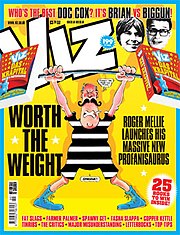
THE final part of BBC Four's Comics Britannia covered the period from the late 1970s when comics grew up. OK, maybe "grew up" is not the right phrase – especially as the programme opened with a look at Viz comic. Perhaps, "annoyed the grown-ups" is more appropriate, as this was when comics started to become grittier and more realistic, a world away from the Beano and the Dandy.
The documentary rightly asserted that although, on the face of it, Viz was just a downmarket rag packed with toilet humour and some creative swearing (Johnny Fartpants was looked at in some depth) its cultural significance cannot be underestimated. Comedian Frank Skinner argued that it was the first time that a type of humour experienced everyday in the schoolyard and in the pub broke into the mainstream.
This was made possible because Viz sprang not from the mainstream media but from the underground fanzine culture that sprang out of punk, and not from London but Newcastle. It was an authentic voice. Comedian Stewart Lee and others were called upon to read some of the Top Tips from the comic, laughter was mandatory. And with its non-PC characters such as Sid the Sexist and Millie Tant, Viz did not toe the line of the new politically correct comedy establishment. As Skinner commented, Viz "has a beautiful freedom about it".
Deftly pulling together some seemingly very different threads the programme moved on to Action comic which was around in the same late 70s period. The IPC comic was a very different animal to Viz, being a "serious" comic aimed at boys, but it was breaking similar taboos. It featured antiheroes rather than square-jawed heroes, and some quite violent storylines. Strips such as Look Out For Lefty, which covered football hooliganism and was a kind of dark twin to Roy of the Rovers, provoked the fury of the tabloid press. Action was withdrawn by IPC and later closed down.
Pat Mills, the man behind Action and a key figure in British comics, pointed out that it was effectively relaunched under the cloak of science-fiction, as 2000AD. They found they could get away with violent and challenging stories that reflected contemporary Britain ... if they were not set in contemporary Britain. Spanish artist Carlos Esquerra (who must have been a bit miffed to be given subtitles even though he was speaking English!) was on hand to draw Judge Dredd and talk about how his experience of growing up under Franco informed his depiction of the fascistic lawman.

From 2000AD we moved on to the career of one of its writers, and one of the most significant players in comics: Alan Moore. It's always a joy to see Moore on the telly, especially so soon after he popped up in Jonathan Ross's BBC Four documentary about reclusive Spider-Man artist Steve Ditko. We looked at Moore's V for Vendetta, created with David Lloyd, the story of Britain under a fascist dictatorship and inspired by the dark days of early 80s Thatcherism. We learned that it was very deliberately aimed at adults, with Moore and Lloyd eschewing Biff! Bang! Pow! sound effects and thought bubbles, and introducing a depth never before seen in comics.
The "British invasion", which saw UK comics writers and artists headhunted by the Americans, came next. This led to the classic Watchmen, created by Moore and Dave Gibbons, which imagined what superheroes would be like in the real world (the answer: fascist nutcases). Moore's reading of the Rorschach character was a joy, even if you had never imagined the creepy vigilante with a Northampton burr.
The final part of Comics Britannia was a good overview of comics' latter history, though there were some omissions. Where, for example, was Moore and Eddie Campbell's epic From Hell? But sometimes it's good to be left wanting more, or indeed wanting Moore. Someone should give that man his own chatshow.
Link: Comics Britannia
